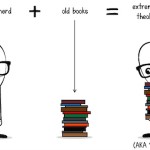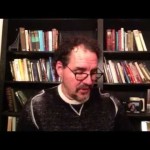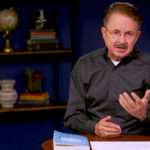We run our website the way we wished the whole internet worked: we provide high quality original content with no ads. We are funded solely by your direct support. Please consider supporting this project.
The Future of Theology
Chris Moore via Compfight
Roger Olson recently published a blog arguing that there really are no new ideas out there in the realm of theology. Everything has pretty much been thought of or proposed. That idea or book that’s causing such a stir? Rewarmed material that someone else already thought of.
So what is there left for theology to do?
Roger wrote a follow-up article that answers this question. He notes that many of the old ideas have had problems in the way the were articulated, and modern theologians have refined them or presented them in ways that solved these problems. For example:
When Gottfried Thomasius (d. 1875) proposed what came to be called “kenotic Christology” it was fraught with problems and widely rejected as seriously harming the doctrine of God if not the deity of Christ. However, English kenotic theologians such as Peter Taylor Forsyth (d. 1921) fixed those problems (e.g., in the Person and Work of Jesus Christ).
When so-called “open theism” first appeared among evangelicals in the late 20th century it had some serious defects. What was called open theism had been proposed before and those defects had hindered its acceptance by many sympathetic people. Greg Boyd, however, re-articulated open theism in a way that made it more acceptable because, as he articulates it, it isn’t about any limitation of God but about the future.
As to the future of theology, he goes on to say:
So what does the future of Christian theology look like? It will continue to perform its critical tasks. It will continue to explore traditional ideas/doctrines/models of God and attempt to make fruitful ones more intelligible and acceptable to faithful people of God. And it will attempt to find new ways to express traditional ideas/doctrines/models of God such as the Trinity so that they are understandable by contemporary people in many different culture.
We’re grateful here at ReKnew to be a part of this work.
Category: General
Tags: Kenosis, Open Theism, Roger Olson, Theology, Trinity
Related Reading

Lighten Up: Are You a Theology Nerd?
Are you a theology nerd? Click here, and if you find yourself nodding your head a lot, you probably are. And that’s OK. Image via Adam Ford

What is the significance of Deuteronomy 13:1–3?
Moses tells the Israelites that God allowed false prophets to sometimes be correct because “the Lord your God is testing you, to know whether you indeed love the Lord your God with all your heart and soul.” If God already knows such matters with certainty, Scripture’s inspired description as to why such testings take place…

Free Will: What does Quantum Theory suggest?
Bet you didn’t think we’d be going here. Greg discusses how quantum theory supports the idea of free will.

A Brief Theology of God’s Love
The most profound truth of the Bible is that “God is love” (1 John 4:8, 16). This is the most fundamental thing to be said about God, for it encompasses everything else that can be said about God. Peter Kreft explains this passage it this way: Love is God’s essence. Nowhere else does Scripture express…

Greg on the Open View of the Future
Greg was featured today on the Pangea blog. (Thanks Kurt!) The blog references a series of lectures Greg presented at the Open Theology and Science Conference at Azusa Pacific University, April 11, 2008 entitled “A Flexible Sovereignty: A Biblical Understanding of Providence and the Nature of the Future” . If you’re looking for a comprehensive video series on…

Podcast: Do You Know Roger Olson Personally?
Greg talks about his relationship with Roger Olson and why he and Roger referred to themselves as ‘The Odd Couple.’ http://traffic.libsyn.com/askgregboyd/Episode_0361.mp3

